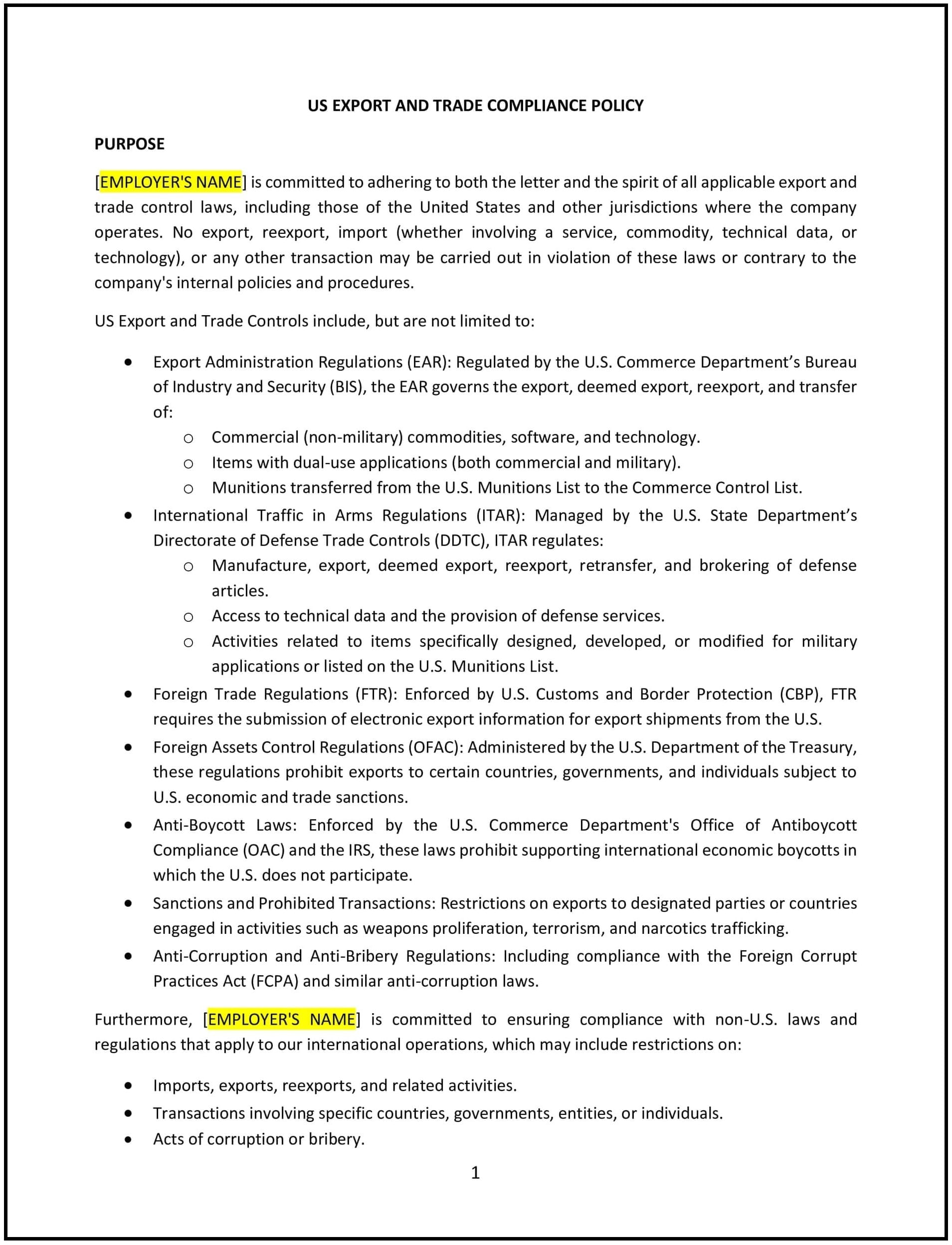US export and trade compliance policy (Massachusetts): Free template
Got contracts to review? While you're here for policies, let Cobrief make contract review effortless—start your free review now.

Customize this template for free
This US export and trade compliance policy is designed to help Massachusetts businesses comply with U.S. export control laws and regulations, including those set by the U.S. Department of Commerce’s Bureau of Industry and Security (BIS), the U.S. State Department’s Directorate of Defense Trade Controls (DDTC), and other relevant federal agencies. The policy outlines the company’s approach to managing export and trade compliance, including the screening of goods, services, technology, and information for compliance with U.S. export restrictions.
By adopting this policy, businesses can mitigate the risk of non-compliance with U.S. export control laws, protect sensitive information, and maintain ethical business practices in international trade.
How to use this US export and trade compliance policy (Massachusetts)
- Define export controls: Clearly define what constitutes export controls in the context of the policy. This includes the shipment, transfer, or transmission of goods, technology, or services to foreign countries, entities, or individuals that may be restricted by U.S. law.
- Identify restricted parties and countries: The policy should include a list of restricted countries, entities, and individuals subject to U.S. trade restrictions. It should also specify procedures for screening parties involved in export transactions to ensure they are not on any restricted lists, such as the U.S. Department of Commerce’s Entity List or the Specially Designated Nationals (SDN) list.
- Clarify licensing requirements: The policy should outline when an export license is required for transactions involving controlled items, technologies, or services. It should provide a clear process for determining whether a license is necessary and the steps for obtaining the required authorization from relevant government agencies.
- Define internal controls and procedures: Specify internal procedures for ensuring compliance with U.S. export and trade regulations. This may include training employees involved in export activities, implementing screening tools for trade transactions, and maintaining records of exports and licenses.
- Address the transfer of sensitive technology and information: The policy should provide guidance on how to handle sensitive technology and information, including encryption software and data related to national security. This includes ensuring that any transfers or communications are compliant with the Export Administration Regulations (EAR) and International Traffic in Arms Regulations (ITAR).
- Address third-party agents and distributors: If the company works with third-party agents, distributors, or partners in other countries, the policy should outline the due diligence process to ensure these entities are compliant with U.S. export and trade laws.
- Ensure compliance with Massachusetts state laws: While export compliance is largely regulated at the federal level, ensure that the policy aligns with any relevant Massachusetts state laws or regulations that may affect international trade or business practices.
- Review and update regularly: Periodically review and update the policy to ensure it remains compliant with changes in U.S. export and trade laws, federal regulations, and international trade agreements.
Benefits of using this US export and trade compliance policy (Massachusetts)
This policy offers several benefits for Massachusetts businesses:
- Mitigates legal risks: By enhancing compliance with U.S. export control laws, businesses can minimize the risk of penalties, fines, or legal action related to non-compliance.
- Promotes ethical business practices: The policy helps businesses operate in a transparent and ethical manner by adhering to laws designed to protect national security and prevent trade with restricted entities or countries.
- Protects sensitive information: The policy helps safeguard sensitive technology, data, and intellectual property from being improperly shared or transferred to foreign entities that may pose security risks.
- Enhances business reputation: A strong commitment to export compliance enhances the company’s reputation as a responsible and ethical business partner, making it more attractive to clients, investors, and partners.
- Ensures smooth international transactions: By implementing effective internal controls and compliance procedures, businesses can streamline their international trade operations, ensuring that export transactions proceed smoothly and in accordance with U.S. law.
- Aligns with global trade practices: Compliance with U.S. export laws also ensures that businesses can adhere to global trade practices and international agreements, reducing the risk of trade restrictions or delays in business operations.
Tips for using this US export and trade compliance policy (Massachusetts)
- Communicate the policy clearly: Ensure that all employees, especially those involved in international sales, trade, or technology transfers, are aware of the US export and trade compliance policy. Include the policy in the employee handbook and review it during onboarding or periodic training sessions.
- Implement screening processes: Use screening tools or services to check potential customers, distributors, and business partners against restricted lists. Ensure that all export transactions are verified against these lists before proceeding.
- Train relevant staff: Provide regular training for employees involved in export transactions to ensure they understand U.S. export control regulations and how to properly manage compliance procedures.
- Maintain detailed records: Keep accurate records of all export transactions, including licenses obtained, parties involved, and compliance documentation. This will help ensure accountability and transparency in case of audits or inquiries.
- Work with legal counsel: Consult with legal counsel specializing in export control laws to ensure the policy is in line with the most recent regulations and to get guidance on specific export scenarios that may be complex or require legal clarification.
- Review and update regularly: Periodically review the policy to ensure it remains aligned with federal and Massachusetts state laws, changes in international trade agreements, and best practices in export compliance.